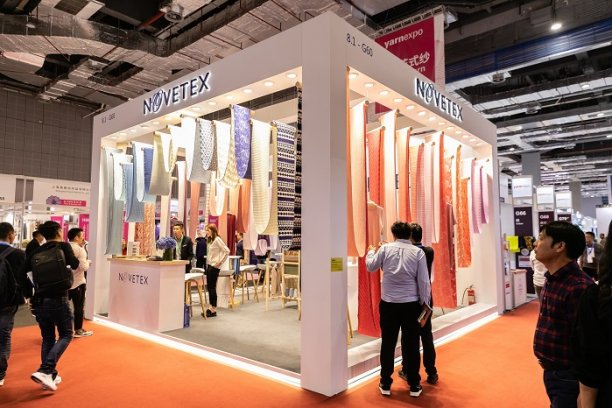
Polygiene and Sinterama to launch recycled fibre with Permanent Odor Control Technology
Sinterama, a European leader in the production of coloured polyester threads and yarns, is celebrating 50 years.

6th March 2019
Innovation in Textiles
|
Shanghai
Sinterama Asia’s booth at Yarn Expo Autumn 2018. © Yarn Expo Autumn
Sinterama, a European leader in the production of coloured polyester threads and yarns, is celebrating 50 years. By offering a wide variety of specialist polyester yarns, Sinterama Asia experienced high visitor footfall and back-to-back client meetings during last year’s Yarn Expo Autumn, the company’s first ever trade fair in China.
The next autumn edition of Asia’s leading trade platform for the yarn and fibre industry will take place from 25-27 September 2019, welcoming quality suppliers from around the world showcasing natural and blended yarns including cotton, wool, flax, and man-made fibres and yarns, as well as specialty products including elastic, fancy and blended yarns. Meanwhile, Yarn Expo Spring is getting ready to open its doors next week.
The show organisers sat down with Ashish Puri, Managing Director of Sinterama Asia, to discuss how the company presents its greener solutions to the Chinese market.
Could you give us an introduction of your company and your products on offer?
Ashish Puri: The Sinterama Group traces its history back to Italy where it was founded in 1968. Over the years, as polyester markets matured in Europe, it has transformed itself into a specialist yarn producer. From Italy, it has expanded to multiple global locations with a footprint in the UK, Bulgaria, Brazil, and of course here in China. We see a lot of growth opportunities in China, because these markets are just starting to mature with a shift from quantity to quality.
China will see its future as a producer of value-added specialised products. It can no longer compete on high volume commodities. This is where we step in to serve the market for customised solutions - offering yarns for performance. Going forward we are driving the market to focus on sustainability – this in our opinion will be a critical differentiator in the years to come.
How does Sinterama Asia approach sustainability in the yarn industry?
AP: Sustainability gets a lot of lip service in the market today with many players trying to cash in on the trend. We tend to see it differently - as a way of life, as a way of conducting our business, as a method of manufacturing. We have the Newlife brand, which is not just a recycled yarn, for us it’s a way of working and living. The Newlife concept is applied to every single aspect of our manufacturing, every single aspect of how we do business. We keep asking ourselves, what can we do to make this industry a more sustainable platform? For example, we try our best to reduce plastic in our manufacturing process, we recycle our plastic bobbins, we recycle our cartons, we monitor our resource usage – materials, fuel, energy.
We work with clients to see how our packaging can be reused by them. We encourage our employees to use less plastic, not just at work but in their own homes as well. We want it to be a way of life. We communicate with all stake holders – clients, suppliers, employees, associates – the importance of respecting the environment and using sustainability as the basic mantra in all our business practices.
What are the challenges in presenting eco-friendly products to the China market?
AP: We have seen a lot of interest in our products, but we find a recurring problem. We are just a cog in the supply chain wheel. Our reach is B2B, not B2C. The final B2C step are the big brands with high visibility. A lot of them want to be seen using sustainable materials but they demand that the supply chain make it cost-neutral. So in effect, the full additional cost burden of making a sustainable product is shifted to the supply chain’s shoulders. This is unfair. It’s an effort we should all be making together.
We want to encourage clients to come on board as Newlife partners. We have no intent to use it as a profit-gouging opportunity. But a sustainable footprint costs more, and the big brands need to step forward and be willing to listen to the supply chain and participate in the cost burden. Asking suppliers to deliver a recycled yarn-based fabric or garment at no extra cost is in itself unsustainable. The challenge is finding big brands willing to accept cost-differentiation for recycled yarn-based products.
Has Yarn Expo helped you to meet brands who are willing to invest and collaborate with you in this green approach?
AP: We are here at Yarn Expo to gain more brand exposure and we are pleased by the number of enquiries from domestic and overseas buyers. We have met with some smaller boutique brands who are really committed and serious about their sustainability efforts. It’s such a pleasure to find these companies and people who are genuinely committed to sustainability, because this is something you have to do with your heart. Yarn Expo has helped us to meet a lot of potential clients and I feel very positive about some of our new contacts.
Do you have any advice for other companies looking to succeed in this market?
AP: It’s futile to compete on price, there are dozens and dozens of players willing to compete on this. It’s more about product differentiation and service, that’s the key to playing in this game. And then of course, it’s really important to take care of your team. We want work to be “serious fun” not a stressful, profit-at-any-cost, do-or-die environment. These values, the service, the customisation makes our brand stronger. It’s not just about the yarn, it’s about the concept of working and delivering as a team.

Business intelligence for the fibre, textiles and apparel industries: technologies, innovations, markets, investments, trade policy, sourcing, strategy...
Find out more